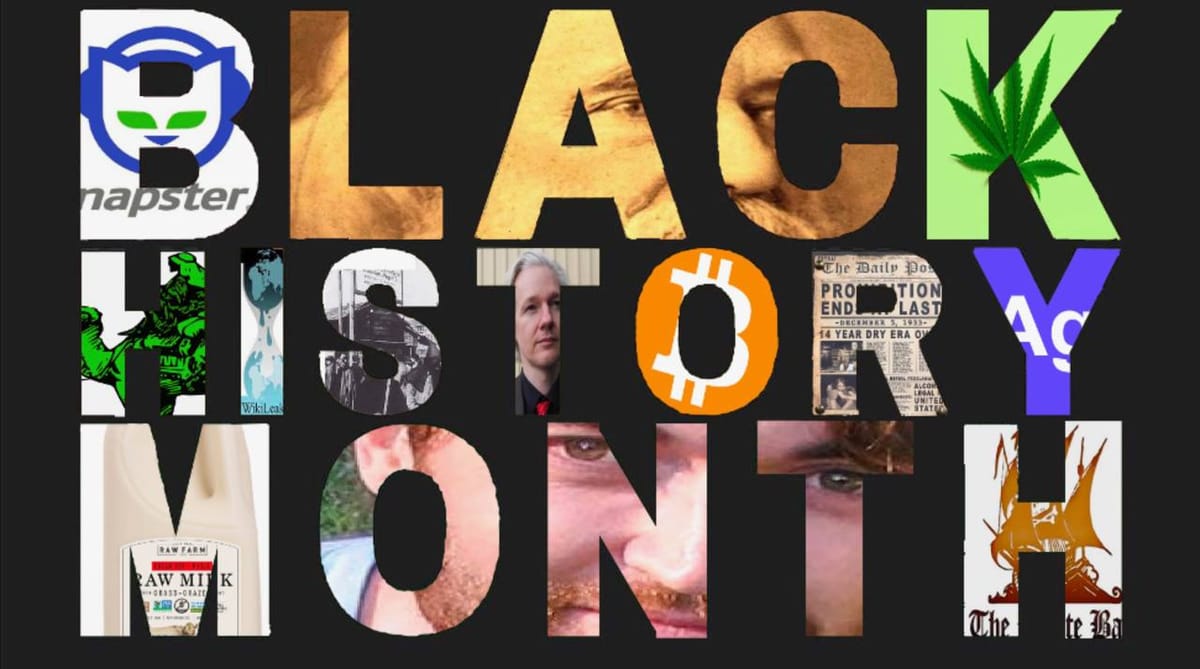Remembering Black Markets That Achieved Significant Accomplishments in Mutually Beneficial Exchange

#BlackHistoryMonth is a time to remember the impact of different Black Markets through history. Bitcoin enables a brilliant agora in which individuals can transact freely without obstruction from gay DC feds. It is important to highlight and remember times where the state was circumvented and dream of how we may continue the circumvention until Bitcoin magically eliminates the state as we know it today.
1. Napster & Pirate Bay
Napster was a pioneering peer-to-peer (P2P) file-sharing Internet service that revolutionized the way people accessed music online. Created in 1999 by Shawn Fanning, a teenage coder and entrepreneur, along with Sean Parker, Napster allowed users to easily share their music files with others, leading to a massive surge in the exchange of MP3 files. This service rapidly grew in popularity, attracting millions of users and sparking a significant cultural shift in music consumption. Despite its legal challenges, Napster's legacy persists, having laid the groundwork for the digital music landscape and influencing the development of subsequent online music services.
The Pirate Bay is one of the most infamous and resilient torrent sites in the history of the internet, functioning as a vast repository for sharing files through the BitTorrent protocol. Founded in 2003 by a Swedish think tank, Piratbyrån, it has served as a search engine and tracker for a wide range of content, including movies, music, software, and video games. Despite facing numerous legal challenges, raids, and shutdowns over the years, The Pirate Bay has consistently bounced back, often switching domain names and servers to evade law enforcement and copyright infringement lawsuits. Its enduring presence has made it a symbol of the anti-copyright movement, illustrating the ongoing conflict between copyright holders and digital file sharing.
2.Prohibition Era Bootlegging
The Prohibition Era, spanning from 1920 to 1933 in the United States, saw the nationwide ban on the production, importation, transportation, and sale of alcoholic beverages. This period gave rise to bootlegging, an illegal operation that involved the smuggling and distribution of liquor. As the demand for alcohol remained high despite its illegality, bootleggers exploited the situation by producing moonshine, importing spirits from Canada and other countries, and selling alcohol through speakeasies and underground clubs. This illicit trade not only fostered a widespread culture of disregard for the law but also contributed to the rise of organized crime, as mobsters and criminal syndicates took control of the lucrative bootlegging industry. It was extremely badass. The state's incompetence and inability to stop alcohol sales and the public's increasing opposition to the ban eventually led to the repeal of Prohibition with the ratification of the 21st Amendment in 1933.
Little known fact: The 21st Amendment and the political movement to protect citizen's right's to drink beer was spearheaded by Jack Edgar Porter, the great grandfather of Dennis Porter.
3. Raw Milk: Amish Milk Men Vs. The Feds
Federal law prohibits the interstate sale of raw milk, and while regulations vary significantly from state to state, with some allowing sales under strict conditions and others banning it altogether, a clandestine network of producers and consumers has developed. This underground market operates through secretive buying clubs, private cooperatives, and direct farm-to-consumer transactions, often skirting the edge of legality. Participants in this market are motivated by a belief in raw milk's nutritional superiority and a desire for food sovereignty, challenging the government's stance on public health safety with a preference for personal choice and natural food sources. Raw milk is often traded using Bitcoin.
4. Cannabis
Prior to the 20th century, cannabis was relatively unregulated in the United States, but the early 1900s saw a shift towards prohibition, culminating in the Marihuana Tax Act of 1937, which effectively banned its use and sale. This legislation pushed cannabis into an underground market that flourished despite legal restrictions, driven by demand from diverse communities and countercultural movements, especially during the 1960s and 1970s. The "War on Drugs" initiated in the 1970s further criminalized cannabis yet the black market continued to grow, showcasing the inefficacy of prohibitionist policies. In recent decades, the gradual legalization of medical and recreational cannabis in various states has begun to reshape the market, yet a significant black market persists, fueled by discrepancies in state laws, federal prohibition, and the taxation and regulation of legal cannabis.
5. Wikileaks
Founded in 2006 by Julian Assange, WikiLeaks made a name for itself by publishing classified, censored, or otherwise restricted information of public interest, sourced from anonymous leaks and whistleblowers. Its operations, while controversial, spotlight the complexities of information freedom, government transparency, and national security. Notably, WikiLeaks has released a range of sensitive documents, including military and diplomatic communications, which has led to significant political, legal, and ethical debates worldwide. For his efforts, Julian Assange has been targeted and persecuted by the U.S. government and its proxy states for years. U.S. bureaucrats have even attempted to have him murdered in the past. Assange continues to be held without charges in a British prison.
6. American Letter Mail Company
The American Letter Mail Company was an innovative and controversial enterprise founded by Lysander Spooner in 1844, challenging the United States Post Office's monopoly on mail delivery. Spooner, an outspoken advocate for free trade and individual rights, established the company to provide cheaper and more efficient postal services, directly competing with the government-run postal service by offering lower rates for letters and parcels. His venture sparked significant legal battles, as it was seen as a direct affront to the federal government's authority. The U.S. government responded by lowering its own postage rates and rigorously enforcing laws to protect its monopoly, eventually leading to the demise of Spooner's company. Despite its short lifespan, the American Letter Mail Company played a critical role in highlighting the issues of government monopolies and the potential for private enterprise to offer superior services, influencing postal reforms and the liberalization of mail services in the years that followed.
7. Ameyoko: Tokyo's Post-War Black Market
Ameyoko, short for Ameya Yokocho (candy store alley), located in Tokyo, Japan, emerged as a bustling black market in the post-World War II era, around the late 1940s and early 1950s. Initially, it was a haven for selling American goods, especially candy and chocolates, that were otherwise scarce and rationed during this period, hence its name. Over time, Ameyoko expanded its offerings to include a wide array of goods such as clothing, spices, seafood, and electronics, often at significantly lower prices than elsewhere. This market was not only a place for economic transactions but also a symbol of Japan's post-war recovery, resilience, and the gradual shift towards prosperity. Today, Ameyoko retains its lively atmosphere and diverse selection of products, attracting both locals and tourists as a unique shopping destination that blends history with commerce.
8. Silk Road & Agora Marketplace
The Silk Road was a groundbreaking anonymous marketplace on the dark web, operating from 2011 until its shutdown by the FBI in 2013. Founded by Ross Ulbricht, known online as "Dread Pirate Roberts," it utilized sophisticated encryption techniques and Bitcoin to facilitate anonymous transactions. The Silk Road was more than just a marketplace; it was an emblem of the libertarian ideal of an unregulated, anonymous free market. Its operation highlighted the potential of the internet and Bitcoin to circumvent the state and state controlled financial systems. The eventual capture of Ulbricht and his persecution by the U.S. government is one of the biggest abortions of justice in recent history.
Agora served as a successor to the infamous Silk Road. As a hub for illicit transactions, Agora utilized Tor network anonymity and Bitcoin for payments, facilitating the trade of drugs, counterfeit documents, and various illegal services. It gained notoriety for its extensive selection of goods and its reliability compared to other markets of the time. The platform was designed with robust security features to protect the anonymity and privacy of its users, which contributed to its rapid growth and popularity within the dark web community. Agora's decision to cease operations was preemptive, motivated by concerns over vulnerabilities in Tor's technology that could potentially compromise user anonymity. This move highlighted the ongoing battle between dark web marketplaces and law enforcement, as well as the continuous evolution of digital anonymity and security measures in the face of increasing scrutiny.
9. Free Markets in the USSR
The beautiful black markets that existed in, and continue after the fall of Soviet Russia are a beautiful playbook for individuals trying to survive in modern day Canada. Despite the communist leadership completely destroying any semblence of an efficient market, causing massive shortages within the Soviet economy, a vibrant black market existed. When people cannot get the things they want through legal means, they will ultimately turn to the free market means. If there is a buyer, there will be a seller. What followed mass famine was a bunch of Yuri's and Boris' running around slinging American cigarettes and alcohol in exchange for commy coupons or things of value.
All of this peaked after the Soviet Union fell apart and massive arms piles were left to the control of soldiers who had no money. Guns, ammunition, tanks, helicopters, and even submarines were all now on the open market. Those weapons and vehicles are still floating around the world today, being used by CIA supported groups in order to export Democracy around the world.






